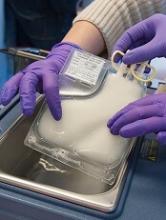The US Food and Drug Administration (FDA) has granted priority review for a biologics license application (BLA) for CTL019 (tisagenlecleucel-T), an investigational chimeric antigen receptor (CAR) T-cell therapy.
The BLA is for CTL019 as a treatment for pediatric patients and young adults with relapsed or refractory B-cell acute lymphoblastic leukemia (ALL).
The FDA grants priority review to applications for products that may provide significant improvements in the treatment, diagnosis, or prevention of serious conditions.
The agency’s goal is to take action on a priority review application within 6 months of receiving it, rather than the standard 10 months.
The FDA accepted the BLA for CTL019 yesterday, according to Novartis.
About CTL019
CTL019 consists of autologous T cells expressing a CD19-specific CAR. The therapy was first developed by the University of Pennsylvania.
In 2012, the university and Novartis entered into a global collaboration to further research, develop, and commercialize CAR-T cell therapies, including CTL019. Novartis holds the worldwide rights to CARs developed through the collaboration.
CTL019 already has breakthrough therapy designation for the treatment of adults and children with relapsed/refractory ALL.
Novartis said it is planning additional filings for CTL019 in the US and European Union later this year, including a BLA with the FDA for the treatment of adults with relapsed/refractory diffuse large B-cell lymphoma (DLBCL) and applications for marketing authorization with the European Medicines Agency in relapsed/refractory B-cell ALL and relapsed/refractory DLBCL.
Trials of CTL019 in ALL
The priority review designation for CTL019 is based on results from the Novartis-sponsored ELIANA study (NCT02435849). Results from this international, phase 2 trial were presented at ASH 2016.
The trial enrolled patients who had CD19-positive B-ALL with morphologic marrow tumor involvement at registration (>5% blasts) and were primary refractory, were chemo-refractory after first relapse, had relapsed after second-line therapy, or were ineligible for allogeneic hematopoietic stem cell transplant.
Most patients received fludarabine/cyclophosphamide lymphodepleting chemotherapy followed by a single dose of CTL019.
Three months post-infusion, 82% of patients (41/50) had achieved a complete response or complete response with incomplete blood count recovery.
Nearly half of the patients in the trial (48%) experienced grade 3/4 cytokine release syndrome (CRS), though there were no deaths due to CRS. Fifteen percent of patients experienced grade 3 neurological and psychiatric events, including confusion, delirium, encephalopathy, agitation, and seizure.
The BLA for CTL019 is also supported by results from the phase 2 ENSIGN trial, which were presented at ASH 2016, and results of a pilot study in patients with relapsed/refractory ALL, which were presented at ASH 2015.


